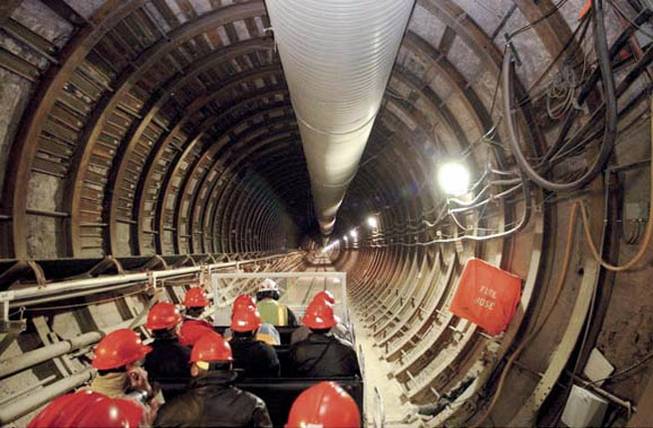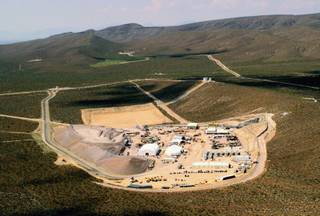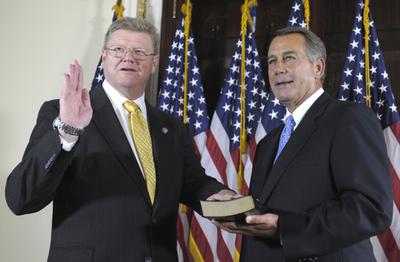Thursday, Nov. 10, 2011 | 2 a.m.
Sun Coverage
For the three decades that Yucca Mountain has been targeted as the best place to bury the nation’s nuclear waste, any discussion of funding its development has been anathema for Nevada’s representatives in Washington.
That has changed in recent months. Now, not only are two of the five members of the state’s delegation willing to converse about ways to keep project development funds flowing, Nevada has for the first time a congressman — Rep. Mark Amodei — who’s open to the idea of carting at least some nuclear waste into the state.
“I have said, and continue to say, nobody wants a nuclear landfill. But I think to make that the last sentence is not realistic,” Amodei told the Sun last month.
“If I’m wrong,” he added, “somebody can shout me down.”
As Senate majority leader, Harry Reid has rendered academic much of the debate over Yucca Mountain. But the shift in the delegation’s dynamics comes as Reid’s Republican opponents think they have an opening to resurrect the project by retaking the majority in the U.S. Senate next year.
A preview of this fight could come this month, as Illinois Sen. Mark Kirk pushes to once again fund the nuclear waste facility. Republicans are treating an amendment Kirk plans to propose to an Energy and Water appropriations bill as a warm-up round: They expect Reid will block it, but they’re laying the groundwork for what may follow if they can retake the majority and thus remove Reid and his objections to all things Yucca.
•••
Two hours into his first day as a congressman, Amodei got his first official visit: from Nye County Commissioner Gary Hollis, an advocate for allowing nuclear waste to come to Yucca Mountain.
Hollis, who was in Washington to observe proceedings of the national Blue Ribbon Commission on nuclear waste management, didn’t have an appointment, but couldn’t pass up the opportunity to drop in on the congressman who seemed poised to break Nevada’s seal of silence on Yucca Mountain.
“He has not really told me for or against,” Hollis later told the Sun. “But he sounds like he would be for it, if there’s reprocessing.”
Nuclear reprocessing has become a popular topic among those searching for some sort of third way forward on Yucca Mountain, such as 3rd District Rep. Joe Heck.
Reprocessing nuclear waste for reuse — or at least the potential to — is what has Heck angling to keep some federal funding flowing to the project. He wants to see that money go to develop a research park focused on best practices and new technologies to reprocess the waste — though he’s threaded the political needle by insisting that as part of the plan, no nuclear waste could be imported into Nevada for research.
Amodei finds that position illogical.
“In order to effectively lobby for those positions and those missions, that will require the material be there,” Amodei said. “Just saying ‘no, no’ no matter what ... is unrealistic.”
“There are still 49 other states that have an interest in where that goes,” Amodei continued, “and so I just think it’s prudent to keep your head on a swivel, look for opportunities there that make sense ... and there appears to be some appetite, at least among the folks in (the 2nd Congressional District), to explore the possibility.”
His position is a breath of fresh air to those who say the delegation’s intransigence on the issue has masked the fact that there’s a robust debate going on within the state.
“I don’t think that what Mark Amodei is saying is anything new. I think the fact that Mark Amodei is more willing to say it publicly is what’s new,” said Republican strategist Chuck Muth. “As we progress on this issue, more and more politicians in Nevada are going to find that it’s not the third rail.”
“The political shift in the delegation is far behind the shift in Nevada,” said Republican consultant Robert Uithoven, who advocates a position similar to Amodei’s. “People have been saying this for a long time in Nevada, it’s just politicians have seen polling that scares them on the issue, or they’re afraid to look like they’re weak and not standing up for the state.”
But Nevada politicians who have long since left office disagree.
Former Democratic Sen. Richard Bryan, who says he ran for the Senate in 1988 because of the Nuclear Waste Power Act or “Screw Nevada” bill, which passed Congress the year before, says Amodei’s stance is “a disaster.”
“The idea of moving the nuclear waste into Nevada with the expectation that something in the future could be done is a lose-lose,” Bryan said. “Once it’s here, it will never go anywhere else.”
That’s not such a frightening proposition to people like Hollis. A former employee of Nevada National Security Site and lifelong resident of neighboring Nye County, he has a hard time imagining how anything carted to Yucca Mountain would pose a worse threat to residents than what’s already there — or how the county could better cash in on a national appetite for nuclear power.
Both presidential candidates and pro-Yucca lawmakers have argued that whatever state accepts the waste ought to be rewarded handsomely for doing so — up to $500 million a year, according to one proposal floated in 2008 — and that’s money that could underwrite local projects that support local jobs.
“The simple reality is that we have supported it for years — in, above and below the water table,” Hollis said. “My job is to do whatever I can to take care of Nye County — not the world, not the state — Nye County. And on this issue, Nye County is not opposed to it.”
But Bryan says any lawmaker who’s bought into unfulfilled promises is simply “drinking the Kool-Aid.”
“What kind of a deal are we talking about? What kind of investment are we talking about? Where is the money?” Bryan asked. “I regret that apparently some Nevada Republican representatives have softened their position; I think it’s unfortunate and clearly it does not help. But we’ve got the governor.”
Of all the new Nevada Republicans, Gov. Brian Sandoval has taken the hardest line against Yucca Mountain — but his position is largely irrelevant to the congressional process.
The shift within the delegation, it should be noted, has come with the arrival of new members of Congress: Rep. Shelley Berkley and Sen. Dean Heller have been anti-Yucca since the beginning of their careers and remain so.
But either Berkley or Heller — who are running against each other in a U.S. Senate race — will survive to the next Congress, where they will at best have the status of a freshman lawmaker — leaving the anti-Yucca voices in the delegation even more dependent on Reid and his maneuvers.
“When somebody says something’s dead in Congress, it’s dead until the next bill, it’s dead until the next amendment, it might be dead until the next court decision,” Amodei said. “With all due respect, none of us is in Congress forever.”
•••
Even if Reid loses the majority in the Senate, it doesn’t mean the barricade to Yucca Mountain is instantly removed.
“If the Republicans gain the majority, nobody’s predicting they’ll get 60 seats,” said Sarah Binder, an expert on congressional politics at the Brookings Institution, explaining all that Reid would have to do to maintain opposition to Yucca is keep 41 senators aligned with him to threaten a filibuster — a surmountable hurdle, though “it may become harder for a parochial issue like Yucca Mountain.”
Allegiance from Democrats on the opposition to Yucca Mountain has been hard-won for Reid, and he still doesn’t have total cooperation from his caucus.
But more critically: This is widely expected to be Reid’s last term, which means in a few more years after the election, new thinking could prevail.
“Republicans and Democrats have both had their heads in the sand on this,” Uithoven said. “The Republican Party needs to think bigger — they need to get out of this decades-old mentality of only Yucca. But equally irresponsible is the Harry Reid policy which is ‘shut it all down’ ... I think you need to completely rewrite the Nuclear Waste Policy Act and allow states to enter into a bidding process.”
That is exactly what the field of Republican presidential candidates advocated last month in a CNN debate in Las Vegas: a competitive bidding process in which states that step up to take waste would receive some kind of financial benefit. In that scenario, Sandoval’s opposition to Yucca Mountain could prove consequential.
But for Nevada representatives who hope to find another way forward through Congress, the window of opportunity is closing: the Blue Ribbon Commission concludes its final report in January, and the District of Columbia Court of Appeals begins its proceedings on a suit against the Nuclear Regulatory Commission, brought by South Carolina, aimed at expediting the Yucca Mountain licensing process.
“I’m still amazed that it wasn’t shoved down our throats long ago,” Muth said.




Join the Discussion:
Check this out for a full explanation of our conversion to the LiveFyre commenting system and instructions on how to sign up for an account.
Full comments policy